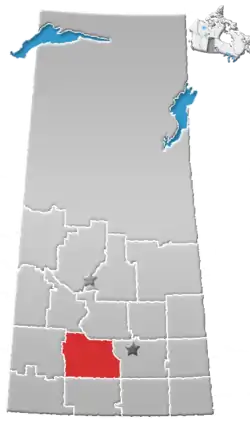Rural Municipality of Victory No. 226
The Rural Municipality of Victory No. 226 (2016 population: 380) is a rural municipality (RM) in the Canadian province of Saskatchewan within Census Division No. 7 and SARM Division No. 3.
Victory No. 226 | |
|---|---|
| Rural Municipality of Victory No. 226 | |
 Location of the RM of Victory No. 226 in Saskatchewan | |
| Coordinates: 50.723°N 107.495°W[1] | |
| Country | Canada |
| Province | Saskatchewan |
| Census division | 7 |
| SARM division | 3 |
| Formed[2] | December 8, 1919 |
| Government | |
| • Reeve | Donald Shirtliff |
| • Governing body | RM of Victory No. 226 Council |
| • Administrator | Diane Watt |
| • Office location | Bleechy |
| Area (2016)[4] | |
| • Land | 1,375.44 km2 (531.06 sq mi) |
| Population (2016)[4] | |
| • Total | 380 |
| • Density | 0.3/km2 (0.8/sq mi) |
| Time zone | CST |
| • Summer (DST) | CST |
| Area code(s) | 306 and 639 |
History
The RM of Victory No. 226 incorporated as a rural municipality on December 8, 1919.[2] The first settlers to the area came in the early 1900s. The community of Demaine was established by the summer of 1908 by a band of settlers who hauled supplies from the Riverhurst area to the east, and across the South Saskatchewan River. Originally all supplies had to be moved from other areas as the settlements were being established.
As with current life in rural municipality the first settlers to the area were farmers who began to grow grain. They farmed with teams of oxen and mules prior to the invention of modern-day farming machinery. Eventually two larger settlements were established. These turned into the Village of Beechy and the Organized Hamlet of Demaine.
Geography
Victory No. 226 is bordered by King George No. 256 in the north, Canaan No. 225 in the east, Lake Diefenbaker, which is part of the South Saskatchewan River in the south, and Lacadena No. 228 in the west. With wide open spaces and small rolling hills the land of Victory No. 226 comprises fertile soil perfect for grain farming. Naturally, much of the landscape is covered by grain farming operations.
Communities and localities
The following urban municipalities are surrounded by the RM.
The following unincorporated communities are within the RM.
- Organized hamlets[5]
Climate
The rural municipality follows the typical climate and weather patterns of the southern half of Saskatchewan by having harsh, dry cold winters, and warm summers.
Demographics
In the 2016 Census of Population conducted by Statistics Canada, the RM of Victory No. 226 recorded a population of 380 living in 121 of its 230 total private dwellings, a -14.2% change from its 2011 population of 443. With a land area of 1,375.44 km2 (531.06 sq mi), it had a population density of 0.3/km2 (0.7/sq mi) in 2016.[4]
In the 2011 Census of Population, the RM of Victory No. 226 recorded a population of 443, a 3.5% change from its 2006 population of 428. With a land area of 1,375.44 km2 (531.06 sq mi), it had a population density of 0.3/km2 (0.8/sq mi) in 2011.[8]
Economy
Its economy is based on agriculture, primarily grain farming with livestock ranching as well.
Government
The RM of Victory No. 226 is governed by an elected municipal council and an appointed administrator that meets on the first Tuesday of every month.[3] The reeve of the RM is Donald Shirtliff while its administrator is Diane Watt.[3] The RM's office is located in Bleechy.[3]
Notable people
- Elwin Hermanson - politician
- Herbert Swan - former Speaker of the Legislative Assembly of Saskatchewan (1982–1986)
References
- "Pre-packaged CSV files - CGN, Canada/Province/Territory (cgn_sk_csv_eng.zip)". Government of Canada. July 24, 2019. Retrieved May 23, 2020.
- "Rural Municipality Incorporations (Alphabetical)". Saskatchewan Ministry of Municipal Affairs. Archived from the original on April 21, 2011. Retrieved May 9, 2020.
- "Municipality Details: RM of Victory No. 226". Government of Saskatchewan. Retrieved May 21, 2020.
- "Population and dwelling counts, for Canada, provinces and territories, and census subdivisions (municipalities), 2016 and 2011 censuses – 100% data (Saskatchewan)". Statistics Canada. February 8, 2017. Retrieved May 1, 2020.
- "2019-2020 Rural Revenue Sharing Organized Hamlet Grant". Government of Saskatchewan. Retrieved May 4, 2020.
- "Saskatchewan Census Population" (PDF). Saskatchewan Bureau of Statistics. Archived from the original (PDF) on September 24, 2015. Retrieved May 9, 2020.
- "Saskatchewan Census Population". Saskatchewan Bureau of Statistics. Retrieved May 9, 2020.
- "Population and dwelling counts, for Canada, provinces and territories, and census subdivisions (municipalities), 2011 and 2006 censuses (Saskatchewan)". Statistics Canada. June 3, 2019. Retrieved May 1, 2020.

